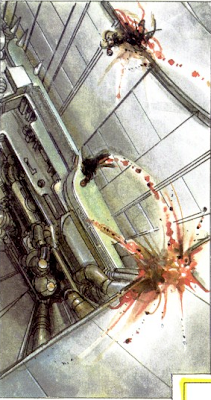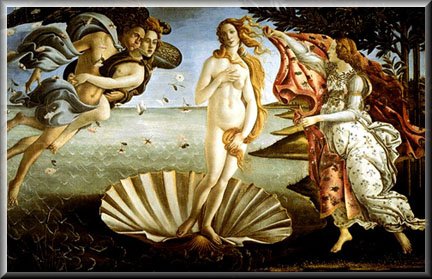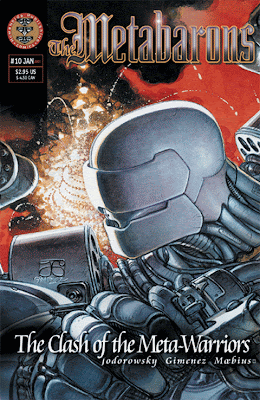Part 2-Aghnar, the best of the lot.
This week, we continue our journey through this epic sci-fi series.
Othon’s tale (mild, yet beautifully presented entrée that it was), ends with the conception of Aghnar and the destruction of the Shabda-Oud cell by him and his wife. Wikipedia will argue that I’m wrong and that Aghnar’s tale begins much later, when he begins his training, but then again I never gave two tugs of a dead dog’s cock about its opinion.
Ooooh! Me 1-Electronic Hivemind 0
With the couple together at last and little future space war criminal in the oven, they’re both living out their days happily in Othon’s personal feud, when disaster strikes: apparently, two of his former concubines, still hopelessly in love with him, decide to kill Onorata, whom they know is a space-witch.
Now, any sane couple of women hopelessly in love with the same man in a planet under the grip of feudal ideology would opt to kill her in her sleep then face their lord and master covered in her blood, begging forgiveness. What these gals do is…way dumber.
Look at this picture. Just…LOOK at it. Somehow, these two girls, these HANDMAIDENS, overpowered the former space-witch with the bitching mind-powers, blindfolded and bound her and then thought: “You know what would be a great idea? Making a scene and killing ourselves at the same time! I’m sure that will not scar our beloved master, losing both the mother of his child and his rebound girls in the same goddamn afternoon!”
“Great idea, sis! And knowing how much of an angry, genocidal bastard our master is, there’s no way he’ll take it out on our species, until we’re all wiped out from the face of the universe!”
“Yaaay!”
And then they totally high-fived each other, cause their plan was solid and awesome and nothing could possibly go wrong with it. True story.
Dumb plan aside, Othon tries to stall for time, so he can get to his murderous-suicidal ex-girlfriends, before they get a chance to kill his wife. He rushes into the armory and knowing that they are about to jump from half a kilometer up and slam into the ground, grabs the only piece of equipment that could possible save the day:
His gun.
With his wife plummeting to her death, Othon takes aim and shoots her, striking her belly. Luckily, the bullet contained some of the Castaka’s anti-gravity oil, which allows Onorata to float safely away, while leaving his crazy exes to plummet to the ground.
One could argue about how Othon could have also attempted to save these two in the same fashion, but they’d just be silly little party-poopers.
Weightless, Onorata gets swept away by a gentle summer breeze and gives birth to Aghnar mid-air. It’s a beautiful scene actually and Jodorowsky’s prose fits Gimenez’s visuals perfectly, unlike a couple other birthing scenes I’ve seen in comic books, which frankly would have worked just as well without having to show us every single little detail.
With the crisis averted (and the grief-stricken father having hung himself in shame), all seems to be going swell in the Metabarons’ tower, until another problem rears its ugly head:
Remember how Othon thought shooting his wife in the belly with a bullet loaded with anti-gravity oil was a good idea? It turns out it wasn’t. Because the boy, Aghnar, having been exposed to the substance at cellular level, is now officially weightless for life. His father (like every considerate Spartan parent) considers killing the child and giving birth to another, but Onorata pleads with him, explain how conceiving him was a sorcerous act which rendered her sterile.
Othon of course, does what every considerate parent coming to terms with his only child’s disability would do:
He makes his own goddamn terms.
So Onorata chooses to exile herself for the sake of her child’s safety, so she can train him into becoming the most vicious warrior/shabda-oud adept the universe has ever seen, for the sake of his caste. She starts at the very first place every mother facing this problem should start, in the hellish polar regions of the planet.

I know that it looks desolate, lifeless and full of space-bats, but I guarantee you that the kids are gonna love it.
With Aghnar by her side, Onorata braves the wastes and finds shelter. There, she raises her son and begins training him in both the art of mortal combat, as well as in using his latent psychic talent, passed on to him by her genes.
The narrative montage that follows also serves another purpose: it gives the character a backstory. It presents Aghnar for what he is: a sad, lonely but tough little boy, trained by his half-mad cultist of a mother solely for the purpose of gaining his father’s respect and love.
During those few frames, Gimenez does a good job showing both the passage of time, as well as the emotional growth of the character. The child starts off a scared little boy and turns into an emotionless teen warrior, driven by his need to leave the frozen hell he has called home and face his tyrant of a father.
Clad in his suit of armor and archaic weapons, the boy has now mastered his disability and become a man. Deemed at last ready by his mother, he is led before Othon, to face the ultimate test of warriorhood.

Apparently in Othon’s dictionary, ‘test of warriorhood’ stands for ‘pitting 13-year olds armed with lances against killbots’
The test is of course unfair and nearly kills him, but Aghnar perseveres, for the sake of both his parents, like the good little abused killing machine that he is. Othon calls bullshit, not believing what he saw, but Onorata won’t have any of it. The boy won, fair and square. But, apparently, besting a towering killbot just isn’t good enough for the father.
Aghnar is then subjected to a second test, that of pain. The boy’s legs are to be crushed in a machine, to test his threshold of pain. Should he pass, he will then accept him as his true heir. Aghnar of course, takes it to the max:
I keep imagining him muttering “Screw yououou daaaddd!” the whole time
With his feet crushed and replaced with cybernetic implants, the boy has both body weight and a place in his father’s eyes. He has surpassed him in every way and the man knows it, even though he never quite says it out loud.
Aghnar’s voluntarily amputation and his tolerance for pain is the action that sets the Metabaronic initiation principle once and for all. What started off as a horrible accident for Othon and the product of inhumanly cruel training for Aghnar, becomes a staple in the series and a pretty cool one, too.
Aghnar grows and it is then that Onorata explains to Othon that they’re not out of the woods yet. The Shabda-Oud, having found out Onorata’s location, seek to take away Aghnar for their own nefarious plans. But the Metabaron family has had enough of their shit.
I’m tried of them motherfuckin space witches stirring up shit!
Using Onorata’s knowledge of the Shabda-Oud’s weaknesses, Othon’s bitchin’ spaceship and Aghnar’s even more awesome space kung-fu, they kill the cultists and live happily ever after.
For about fifteen minutes. Honestly, this family meets with disaster more frequently than Goku’s. And he was a former member of a species of genocidal space monkeys, for fuck’s sake!
Apparently, the Shabda-Oud, ancient paranoid psychic witches that they are, had counted on Onorata pulling a double-cross and had already implanted a powerful bomb in her chest that would destroy the Metabaron’s planet.
Alerted by her, Othon and Aghnar make their getaway, swearing revenge.
They drift for years for planet to planet, seeking refuge and the boy is left to suffer the isolation with his dad, who grows more and more insane every day. When Othon finally snaps, after getting infected by some unspeakable space fungus, he asks for his son to kill him.
The boy tries to reason with his father, but ends up killing him in self defense (then again, maybe not. Maybe he did want to kill his angry insane bastard of a father who hated him for being different and maimed him on purpose. Just throwing that out there.)
Thus, another staple of the Metabaronic initiation ritual is set. Pretty much like in myth, the son must kill the father to take his place.
Or cut off his dong and throw it into the ocean, thus giving birth to the goddess of love; I’m not going to split hairs.
Released from his father’s tyrannical grip, Aghnar befriends the local aliens, helps them and becomes a hero to their species. Using their adoration (and several million kublars worth of surveillance satellites), Aghnar finds a Shabda-Oud ship, hijacks it using his mind powers and finds out their objective: to abduct a princess named Oda.
Aghnar, in proper fairy tale fashion, immediately falls in love with the capricious little hussy who has so far turned down kings, war heroes and noblemen, saying that she will give herself to the man who offers her a blue rose.
Aghnar does what any chivalrous gate-crasher would do: drives his bitching battleship manned by mad witches into her father’s court and finds her. Giving her a mental image of the rose, she accepts him and they sail into the sunset, together.
Now, here’s something I wanted to talk about since the previous installment: The gals in the series. It’s obvious that Gimenez loves drawing women, especially well-endowed women and he does this very, very well. It’s sexy, but it’s not sexual though it does become a tad sexist and/or degrading at times.
Now, I’m a guy and saying stupid shit like ‘I don’t like how women are scantily clad’ or ‘I think Gimenez is sexually repressed and doesn’t get women’ will be a blatant lie. I’m all for skimpy outfits and I love a proper bondage scene when done right.
What my actual problem with Gimenez’s depiction of women is that, well, he is always showing way too much. Oda is beautiful and well-drawn, but I really can’t get that buzz that draws me to the page when she’s essentially naked. A scene can be sexy as all hell, but only when the woman is scantily drawn strategically (i.e. leaves enough stuff to the imagination, but not all or none of it).
And on another note: the women in this series are not objects and they aren’t useless. They’re presented as mates to the most powerful warriors in the universe and tend to pull their own goddamn weight, so I won’t have any shit about women being victimized in this series.
With Oda by his side, Aghnar uses his space monkey army to set his trap in the Shabda-Oud’s mothership. He goes toe to toe with their god, Jejoh.
Sacrificing his arm (loaded with miniature nukes), he destroys the beast and fights against the Shabda-Oud elders. But even with his mighty mental prowess, Aghnar is not strong enough. It is only with Oda’s love and sacrifice that he finds the strength inside him to destroy the elders and save the day.
Of course it doesn’t end. Their fortress may have been destroyed, but they are still surrounded by a fleet of ships, aiming to kill him. With Oda’s mind crushed by the battle of wills, and Aghnar winded by the battle, he is ready to face death.
When from out of nowhere, rescue comes. A mysterious ship destroys the Shabda-Oud’s cetacyborg fleet and saves the day, leading Aghnar and his love to safety. Did Alexandro Jodorowsky pull a deus ex machina? Is this lazy writing? Are we denied a heroic death for our hero?
You see, Aghnar’s mysterious savior was no other than Onorata, who used her ill-defined bullshit space witch powers (presented in an awesome sequence, so I guess I could let it slide), to save herself, build a ship and come to her son’s aid. She promises safety and offers to save Oda for his sake, promising respite from his lifetime of struggle.
It’s at this point that the story takes an interesting turning point. We finally begin to see Aghnar work as a personality, not merely as a badass superhero fuelled by revenge. He has, after all, destroyed the cult that ruined his life and killed his wife and we finally get a chance to see him seek closure. He doesn’t want to remain a killer and he never quite wanted to. Honestly, if Jodorowsky saw fit to end the series at this point, it would make a pretty good ending and it would still be as iconic to me and everyone else who read this.
This of course, is not the case. Aghnar meets with his wife again (saved after his mother sacrificed her own mind for her son’s happiness). Together they live happily ever after in their awesome little home planet, up until Aghnar’s life goes tits-up for the third time since he was born.
In a sci-fi twist to the Oedipus story, Onorata (his crazy space-witch of a mom) placed her mind inside his beloved’s body. Quick question: does it count as incest if it’s your mom in another woman’s body?
YES. YES IT FUCKING DOES.
As expected, Aghnar loses it. He’s been robbed of his chance at happiness, he’s lost pretty much everything and betrayed by his mother, the last surviving member of his family. Like any sane man among us, he’s had enough of this shit. He busts out his disco powers and he’s about to mind blast a bitch, when this happens:
I just love how he’s got an answer for just about everything.
The child’s head is destroyed. Oda-Onorata grafts the baby onto Tonto, the robot and set off to start the cycle of Metabaronic succession anew and all you’re left thinking is: WHAT THE SHIT DID I JUST READ?
I mean, dude, there’s comic book logic and there’s Metabarons logic. Whereas Marvel and DC have repeatedly killed off and brought heroes back in increasingly strange ways, Jodorowsky just shrugged and typed: baby’s head explodes, mad witch mama grafts it onto robot slave. Problem solved!
There’s absolutely nothing to prepare you for this and it just butts inside an otherwise great narrative. It’s apparent that at this point, the creators were anxious to end Aghnar’s story on a tragic note and set the scene for the next Metabaron in line.
Despite the awkward turn however, Aghnar’s descent into darkness is, once again, very well done. Having lost everything, Aghnar turns into a twisted version of his father, minus the purpose. He claims to fight for money, when the only thing he truly desires is the release of death.
This might sound emo and it probably is, but you know what it sounded like to me? Way back when I had only recently watched the Star Wars trilogy (which I watched backwards, mind you, due to a freak video rental store misunderstanding), it seemed to me very much like an origin story for Darth Vader.
Hear me out: during the original trilogy, Anakin Skywalker is presented as a mysterious pilot/warrior with a hazy past, who played some sort of important role in shaping the history of the Galaxy, before he ended up working for the bad guys. In my mind, after reading Aghnar’s tale, this is exactly the kind of story I had woven in my head about Anakin Skywalker. Destined for greatness, trained by a ruthless mother, scorned then accepted by his father, blessed and cursed to live a brief, yet tragic love (minus the incest part, of course).
All in all, Aghnar makes a proper Anakin Skywalker to Darth Vader transition, which in my opinion outshines the bullshit canonical version the way an exploding supernova outshines a lightbulb. You are free to pass judgement on it as you see fit.
Aghnar is finally hired by the Phthagurs, a race of funny-looking aliens, who wish to use him in an effort to eliminate humanity. All seems lost. A champion is needed. Who will step to the fray and claim his rightful place as the champion of mankind?
Slap on a sticker with some bogus praises and you’ve got yourself an album cover.
Yyyyeeaaahhh… it’s only gonna get sillier from here on out, folks.
Post a Comment
























Δεν υπάρχουν σχόλια:
Δημοσίευση σχολίου